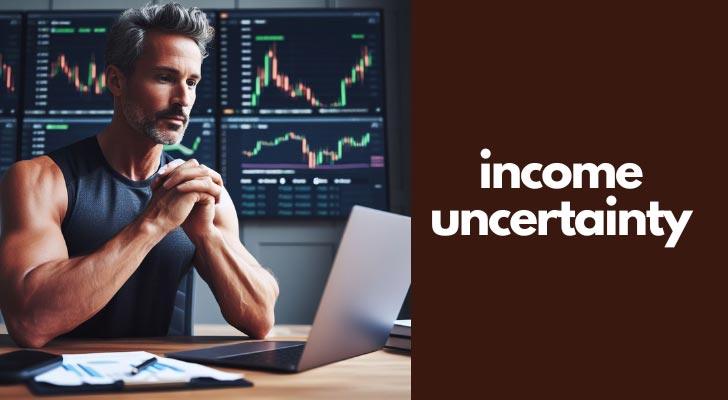Going into investment affiliate marketing can look like a chance to make easy money at first. But, many face harsh truths as they get deeper into it. They hope for steady earnings but find that the money comes in like a slow drip, unpredictable and often disappointing.
The dream of easy days while the money rolls in shatters quickly. The idea of making money by just promoting investment deals becomes a tough test. Sadly, many learn the hard way that this path is strewn with more thorns than roses.

Meager Commissions
In the sphere of investment affiliate marketing, one might assume that high-stake products such as premium investment courses or brokerage services would fetch high commissions. However, this is far from reality.
For example, promoting a $1,000 investment course might only earn you a meager commission of $50. This commission rate of 5% is not at all reflective of the high price tag of the product being promoted.
In many cases, affiliates have to share their already meager commissions with sub-affiliates, further dwindling their earnings.
Endless Hunt for Leads
The battle to find potential leads is ceaseless. For instance, an affiliate might spend weeks trying to promote a high-stake investment product on various platforms such as social media, blogs, and forums.
Despite the efforts, the conversion rates are usually dismally low. It's not uncommon to see conversion rates as low as 1% or 2%, meaning that out of 100 people you manage to drive to the merchant’s site, only one or two might make a purchase.
This stark reality showcases the futile effort in a numbers game where only a small fraction of leads convert into sales.
Unrewarded Time Investment
The hours spent crafting meticulous marketing strategies, creating engaging content, and promoting products are enormous.
For instance, consider an affiliate spending 40 hours a week to promote investment products. Despite this full-time effort, the returns could be as meager as a few hundred dollars a month, far below the minimum wage in many regions.
This horrendous time-to-reward ratio makes the investment affiliate marketing sphere a dubious choice for those seeking a viable income stream.
High Cost of Lead Generation
Many times, affiliates resort to paid advertising to generate leads. However, the cost per click (CPC) in the finance and investment niche is notoriously high.
For example, bidding for keywords on Google Ads might cost upwards of $20 per click for investment-related terms. Generating a single sale could cost hundreds of dollars in advertising spend, wiping out the commission earned from that sale.
This high cost of lead generation, combined with low conversion rates, can lead to a cycle of spending more than what is earned, plunging the affiliate into a financial abyss.
Inconsistent Income Flow
The income from affiliate marketing, especially in the investment domain, is erratic and unreliable.
For instance, an affiliate might earn $1,000 in one month and nothing in the following month, making budgeting and financial planning a nightmare.
The lack of a steady income can create a stressful life filled with financial insecurities, a stark contrast to the passive income dream often sold to prospective affiliates.
Income Uncertainty

The affiliate marketing arena, particularly within the investment sector, is riddled with uncertainties. Earnings are directly tied to conversions; however, the conversion rate can be heavily influenced by market dynamics which are beyond the control of the affiliate.
For instance, suppose an affiliate has been promoting a particular investment training program. A sudden market downturn could deter potential customers from purchasing the program, leading to a sharp decline in the affiliate's earnings without warning.
Additionally, changes in the merchant’s commission structure can also lead to unpredictable fluctuations in income. For example, a reduction in commission rates from 10% to 5% can halve the affiliate’s income overnight.
The Mirage of Steady Earnings
Unlike traditional employment where a fixed salary is expected at the end of each month, affiliate marketing operates on a performance-based earning model. This setup translates to highly variable income, where good months may be followed by a series of poor-performing months.
A scenario could be an affiliate experiencing a windfall in earnings due to a temporary market buzz around a certain investment product. However, as the buzz dies down, so does the affiliate's earnings, potentially plunging them into financial strife.
This inconsistency in earnings makes it incredibly challenging for affiliates to plan their finances, pay their bills, and meet other financial obligations, especially during economic downturns.
Unyielding Competition
The competitive nature of the investment sector further exacerbates financial instability for affiliates.
For example, a new affiliate platform promoting similar investment products might offer higher commissions or better support, drawing traffic and conversions away from existing affiliates.
Moreover, competition often drives up the cost of advertising and marketing, reducing the overall profitability of affiliate campaigns.
Dismal Economic Climate

In a struggling economy, consumers are less likely to spend money on investment products or services, which directly impacts the earnings of investment affiliates.
Additionally, economic hardships often lead to reduced ad spending and lower commission rates, further straining the already fragile financial situation of affiliates.
This grim reality magnifies the financial instability inherent in investment affiliate marketing, making it a perilous venture for those seeking a reliable source of income.
Risk of Financial Ruin
The accumulation of advertising debts, platform subscriptions, and other business-related expenses amidst fluctuating or dwindling income, could lead to financial ruin.
For example, an affiliate might accumulate debt during a marketing campaign expecting a certain return on investment. If the campaign fails to generate the expected conversions, the affiliate is left with a financial hole that can be hard to climb out of.
The pressure to continually perform and outdo competitors just to maintain a semblance of income can lead to a stressful, anxiety-ridden professional life, making the venture more distressing than rewarding.
Risky Stocks: A Bad Idea
Many people rush to buy stocks thinking they'll get rich quick. This can be a mistake. Stocks are unpredictable. Just because a company is doing well today doesn’t mean it will tomorrow. For example, tech companies that everyone thought were the next big thing have gone under overnight. Think about those who invested heavily in them. They lost big time.
Real Estate: Not Always a Win
Everyone says, "Buy land; they're not making it anymore." But real estate is no guarantee of making money. Buying a house sounds great, but there are hidden costs. Taxes, maintenance, and unexpected repairs can eat into profits. And if the market crashes like in 2008? People who bought homes ended up owing more than their homes were worth. That’s a nightmare.
Gold: Glitters but Doesn’t Grow

Gold is another popular investment. People believe it’s safe. But here's the truth: gold doesn't grow. It just sits. It doesn’t earn interest or dividends. Over the long run, it may not even beat inflation. So, let's say you bought a gold bar and locked it in a safe. Ten years later, it’s still just a gold bar. No growth, no extra money.
High-Interest Savings: The Slow Crawl
Some choose to put their money in high-interest savings accounts. Sure, they're safe. But the return is so low. Let’s say you put $1000 in an account with a 2% annual interest rate. After a year, you only make $20. That’s barely enough to buy a decent meal.
Cryptocurrency: The Wild West
Cryptocurrencies, like Bitcoin, have been all the rage. But they're so new and unpredictable. The price can go sky high one day and crash the next. People have lost everything. For example, some people bought Bitcoin when it was almost $20,000 per coin. Later, its price dropped to a fraction of that. Ouch!
Bonds: The Sleepy Investment
Bonds are often called safe. But they can be boring. The return is usually tiny. And if you buy bonds from a company that goes bankrupt? You might get nothing back. Imagine lending money to a friend who promises to pay you back but then moves away and stops talking to you. That's how some bond investors feel.
Penny Stocks: The Ultimate Gamble
Penny stocks are cheap, which makes them tempting. People think, "What if this cheap stock becomes the next big thing?" But they are often too good to be true. Many of these companies have weak foundations. It's like betting your money on a horse just because it has a fun name. Most of the time, you’ll watch your money run away.
Startup Investing: The Dream Crusher
Investing in startups sounds exciting. After all, today's small startup could be tomorrow's tech giant. But most startups fail. And when they do, the money can disappear. For example, someone might invest in a new app thinking it will be the next Facebook. But if the app never takes off, that money is gone.
Art and Collectibles: A Waiting Game
Some people buy art or collectibles hoping they’ll get more valuable over time. But it’s a waiting game. And there's no guarantee. A painting bought today for thousands might end up in a garage sale years later. And those "rare" collectibles? Sometimes they turn out to be not so rare.
Active Mutual Funds: The Fee Trap
Mutual funds pool money collected from a lot of people to invest. But active mutual funds, managed by experts picking stocks, often come with high fees. These fees eat into any money made. And here’s the kicker: most of these funds don't beat the market. So, investors pay more but get average (or below-average) results.
Looking at all these investments, it’s clear that there's no surefire way to get rich quick. Every investment has its drawbacks. It's a world filled with promises that often lead to disappointments. Making smart choices requires caution, research, and sometimes, accepting that there are no guarantees.
The Dark Side of Being an Investment Affiliate - Final Words
Taking a look back, becoming an investment affiliate is not the golden ticket many hope for. The money that comes in doesn’t match the effort put in. The need to always stay ahead, understand tricky investment topics, and face angry customers makes this path a hard one.
The fierce competition makes it harder to shine. And when misleading ads come to light, the trust breaks, leaving a stain on the affiliate’s name.
The dream of easy, good money fades fast, leaving behind a bitter taste of reality. The stories of struggle and disappointment overshadow the few tales of success, showing a gloomy picture that’s hard to ignore.
How I "Finally" Make Over $7,000 Monthly Income
"The most valuable thing I've ever done!"


I lost over $8000 investment because of the scammer I was introduced by someone on Facebook. I learned a big lesson never to trust anyone on social media again. I trusted him because he seems so genuine but I only saw his picture. My friend told me it was an AI image. I reported it to the policy but they don’t want to do nothing because they say I basically agreed to pay.
Hello Kristian, thank you for your comment. I’m sorry to hear that you’ve been scammed. How did it all happen and to which investment scheme did you lose your money to? Share with us if you can to warn others. Thanks.
I was scammed by cryptocurrency affiliate marketers twice last year. You are right, they say things like the price rise was guaranteed or profits daily but I know that they are all BS. I believed what they said actually, they were excellent at technical talk so I didn’t understand half of what they said.
Thank you for your comment, Cocomo. Sorry to hear that you’ve been scammed. We hope that you’ve managed to get at least some of your money back via your credit card company.